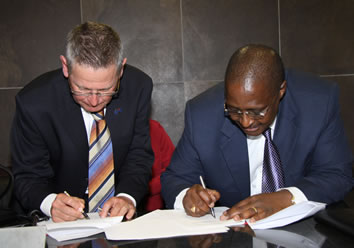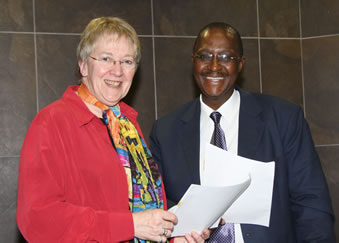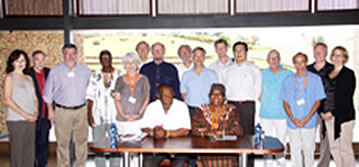UNISA’s Incubator for New Thinking: PASCAL Launch
The DST/NRF SARChI Chair in Development Education at UNISA officially has become the fourth node for the PASCAL International Observatory on human development. At the launch of the African Centre on 29 November 2010 in the Bamboo Auditorium, Kgorong, UNISA’s Principal and Vice-Chancellor, Prof Barney Pityana, reaffirms the university’s commitment to the Chair’s intention to look at new ways of thinking.

A SUSTAINABLE RELATIONSHIP - Professor Barney Pityana, Vice-Chancellor of UNISA and members of the various PASCAL regional centres at the launch of the PASCAL centre at Kgorong, UNISA
“We want to understand how people learn,” says Prof Pityana. He added that the SARChI Chair “is a very bold initiative in an effort to try and gain benefit from the resources that are available at our university and increase focus on research participation.” As an institution that prides itself on doing things differently for the betterment of all people, Prof Pityana says: “We see ourselves as a university with a social purpose and social mandate and SARChI will do more than that – it will be an incubator for fresh thinking.”
 As part of the launch, memorandums of understanding (MOUs) with the other three PASCAL global centres have been signed. These include MOUs with the University of Glasgow, the Royal Melbourne Institute of Technology and Northern Illinois University.
As part of the launch, memorandums of understanding (MOUs) with the other three PASCAL global centres have been signed. These include MOUs with the University of Glasgow, the Royal Melbourne Institute of Technology and Northern Illinois University.
SEALING THE DEAL: Prof Barney Pityana (UNISA) and Prof Bruce Wilson (RMIT) sign the MOU between UNISA and RMIT heralding the start of the cooperation (image right)
 The launch was attended by the PASCAL Governing Board members. The SARChI Chair is acknowledged as an innovation centre in rethinking community engagement through its paradigm of restorative action. Chairman of the PASCAL Board Prof Jarl Bengtsson remains concerned that by far the largest portion of new knowledge production is generated in the private sector and he appeals to universities to get more involved in the knowledge economy.
The launch was attended by the PASCAL Governing Board members. The SARChI Chair is acknowledged as an innovation centre in rethinking community engagement through its paradigm of restorative action. Chairman of the PASCAL Board Prof Jarl Bengtsson remains concerned that by far the largest portion of new knowledge production is generated in the private sector and he appeals to universities to get more involved in the knowledge economy.
SEALING THE DEAL: Prof Barney Pityana (UNISA) and Dr Anne Kaplan (NIU) sign the MOU between UNISA and NIU heralding the start of the cooperation (image left)
The PASCAL launch follows a seven-day intensive retreat organised by the Chair where international scholars, Fellows of the Chair and its student cohort of over 20 postgraduate students met to rethink and deliberate on research proposals and the transformation of the Academy. The SARChI Retreat included a visit to the Freedom Park where Dr Wally Serote, the CEO, addressed delegates of the retreat. His talk centred around IKS, transformation and healing in the South African context.

FREEDOM PARK: A group of international scholars and Fellows of UNISA’s SARChI Chair smile in appreciation after a deep and fascinating address by Dr Wally Serote (seated).
“In the process of interacting with nature we are able to create culture and history and everything we need. In this process we are able to create institutions which become points of knowledge that need to be preserved,” says Dr Serote. Taking great pride in Freedom Park as a dynamic space for South Africans and the world, he has invited people to pay the heritage site a visit: “If you come to Freedom Park you have a choice – either to learn about apartheid or to learn about our rich history and culture.”
 Printer-friendly version
Printer-friendly version- Login to post comments
- 403 reads





